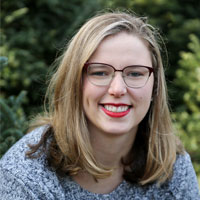 Carolyn Graverson’s First Semester at Grad School
Carolyn Graverson’s First Semester at Grad School
As part of our check-in with the COVID-19 series interviewees, we thought a student’s point of view would be interesting. When we spoke with Carolyn Graverson last spring, she was completing her senior year at Lewis University and preparing to pursue graduate studies in chemistry at Rice University. She was home from Rice when we spoke.
Still not your usual year
Carolyn’s first semester courses were “blended.” Two were fully online; others combined in-person and digital learning. As she worked in a lab and as a TA, Carolyn had high priority status to get weekly COVID-19 tests. These, plus mandatory indoor and outdoor mask-wearing, and students pledging to stay safe and isolate, made it comfortable for Carolyn to be on campus. She attended different groups’ virtual meetings and visited their labs in person to choose her research focus. As there were fewer in-person meetings, it wasn’t the same as pre-pandemic. Nonetheless, Carolyn is happy with her decision to join the Matthew R. Jones Lab, focusing on nanoparticle assembly and ligand design.
Carolyn played basketball for four years at Lewis but doesn’t participate in team sports at Rice. “It was almost a full-time job, with practicing, traveling, and playing games. Now I don’t have that, my workload feels a little lighter. I’m able to focus more on my lab and schoolwork. ”
New ways to build community
“Rice is known for its close-knit (chemistry) department community. It’s relatively small, so you get to know faculty really well. We didn’t have that as much (this year). Parts of orientation were in person. But mostly, everything was virtual. We had department Zoom happy hours where we shared a drink and some laughs. We played bingo and trivia games. But it’s been a little strange. We can’t meet at Valhalla, the on-campus graduate student bar, which is the hub of graduate life. (In the past) talking about your project there with other chemistry graduate students led to many collaborations. It’s hard not getting to know people that way. But the department, and especially some of the older graduate students, reached out and did their best under the circumstances to help us adjust,” said Carolyn.
Living alone in an apartment off campus is a big difference from undergraduate college. “There’s one other grad student living in my apartment complex, and we decided to be ‘pseudo-roommates.’ This is my bubble. I’ve met others in the complex, but most of my social life is on Zoom.”
“ECS meetings helped me make connections. One Rice grad student volunteered at the Dallas meeting. I didn’t attend, but when I met him on campus and learned he was part of ECS, we had something in common. ‘Oh, you know ECS? I know ECS!’ We had a discussion about our ECS experiences.”
On the bright side
Texas sunshine, which is new to the Wisconsin native, has been an unexpected boon for her social life. “It’s nice all the time in Houston, which is amazing! I go outside to eat lunch or drink coffee, and other people are there. We meet in person, chat, and feel comfortable. I can’t imagine trying to meet people in an environment like Wisconsin where you can’t go outside for very long!”
“I was never home for more than 10 days at a time during my four years at Lewis. It was basketball in the winter break and research in the summer. Now that I’m in graduate school, getting home is also going to be a challenge. However, after the pandemic hit, I was home from May through August and again now for an extended winter break, which is great,” said Carolyn.
Carolyn worked with the Keleher Research Group at Lewis. “Before the pandemic, we would get data but never had time to write about it. The pandemic forced us to do that. Three papers have been published from our work during the pandemic. That’s huge for my career as a scientist!”
Advice for graduating college seniors
“Unfortunately, they’re not going to make personal one-on-one connections in the graduate programs that they’re considering. My biggest recommendation is to figure out what kind of research they’re interested in, find those professors’ websites, and then email their graduate students. They’ll get the most honesty from the grad students! They’ll tell them what life is like at the school,” said Carolyn.
Fast forward to the future
Carolyn looks forward to lots of activities in the post-pandemic world. “Rice is really cool in that they have a lot of social events and traditions. People will really enjoy that sense of community again. Being able to see your peers outside of work on regular weekends will be great!”
Carolyn also looks forward to participating in ECS meetings. “I definitely plan on attending ECS meetings if the symposia are related to my research project. I’ve had really positive experiences with past ECS meetings, made good connections, and met people whose work is very relevant to the field. What is really cool about ECS meetings is that they are not hand-wavy discussions; they’re mechanistically driven. With the Keleher Research Group, tons of collaborations resulted from these meetings. We got lots of ideas for our work from different kinds of electrochemical talks that weren’t necessarily in the same field, but were related.”

